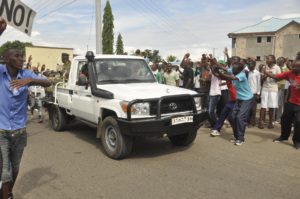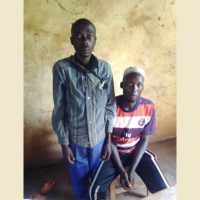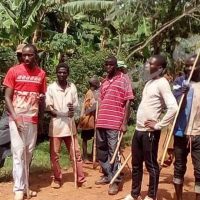Dr Elias Sentamba says armed forces should be politically neutral for peace and prosperity to reign in a country.

Soldiers being cheered by protesters in 2015. At times, protesters were seen hiding behind soldiers to escape police violence
It’s an “insult” for a member of the defence and security bodies to identify with a political party, said Dr Elias Sentamba, a political scientist, on Monday 3 April speaking to the media after his lecture on the importance of the armed forces’ political neutrality. It was on the occasion of the opening of a week dedicated to Science, Culture and Sport at the Higher Institute of Military Officers (ISCAM).
He said that to underscore the categorical imperative of political neutrality that has to guide the armed forces to ensure stability and development of a country.
“Failure by the defence and security bodies to be neutral leads to the loss of trust by the public, and the distrust causes civil wars in which everyone loses”, he said that while concluding his lecture entitled
“Political neutrality of the defence and security bodies: foundation for peace and development”.
Burundi defence and security bodies are not always politically neutral. This was especially true during the protests against President Nkurunziza’s bid for a third term in office in 2015. In some instances, the police and the military were seen displaying different treatment of protesters. And the coup attempt of 13 May 2015 showed that some members of the security and defence bodies sided with the protesters.
Sentamba says such lack of neutrality of Burundi defence and security bodies has at least two causes. Democracy hasn’t very well taken root in Burundi. Moreover, the current bodies are composed of troops that came from different rebel groups and those of the armed forces the groups were fighting. And it is still too early for them to completely sever ties with their backgrounds. “They haven’t got enough time to become a melting pot. It’s a process that takes a long time”, he says.
Col. Gaspard Baratuza, Army Spokesman, doesn’t fully share the view that backgrounds of the bodies still influence them. He says the armed forces were quick to overcome their background affiliations, a fact that has been acknowledged by the international community that later requested Burundi troops for peacekeeping missions in Somalia (2007) and in the Central African Republic (2013).
While Sentamba says the armed forces are on track to full political neutrality, Tatien Sibomana, a political opponent, says the forces are at a higher risk of being manipulated by the executive. “A closer look on how the executive power manages the armed forces shows that there is a great risk of ethnicization and politicisation of the bodies”, he says.
In recent days, rights activists have reported recurring arrests, torture, and deaths of troops that they claim were from both the former national armed forces and Tutsi ethnic background.
Leaders of opposition parties also claim their militants are arrested by the police and intelligence agents for political reasons.
Pierre Nkurikiye, the Spokesman for the Police, says claims that there are people arrested for their political or ethnic belongings are “lies” of politicians. He says “even those who are arrested don’t say they are apprehended for belonging to certain ethnic or political groups because they know they are arrested for crimes they have committed”.



















 IWACU Open Data
IWACU Open Data

